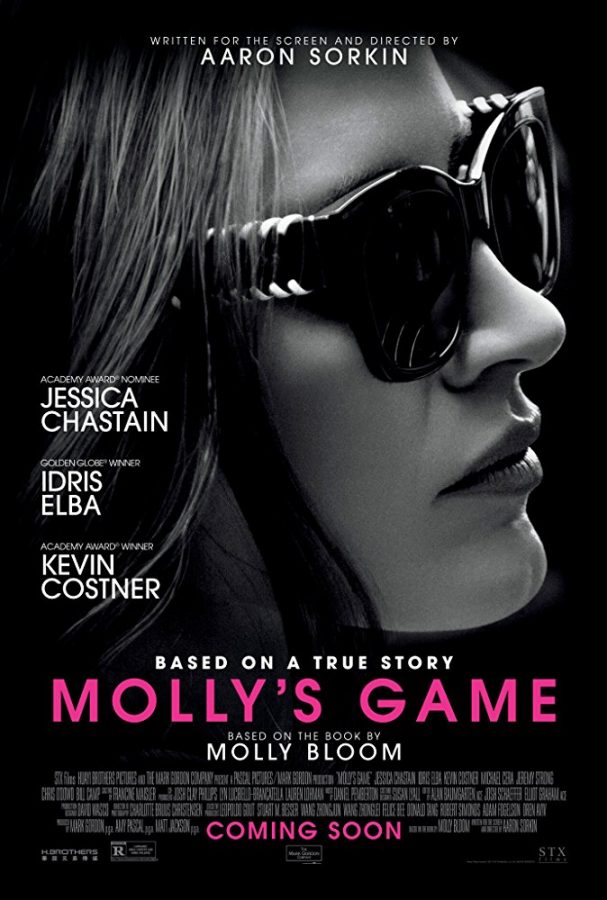“Molly’s Game” deals a winning hand
Screenwriter Aaron Sorkin may be a bit of a wildcard, but with his new film “Molly’s Game,” he’s been dealt a winning hand.
It’s surprising that, after a career spanning more than three decades, Sorkin is just now making his directorial debut. The Oscar-winning screenwriter has previously found success with “The Social Network,” “Moneyball” and “The West Wing,” though with “Molly’s Game,” the thrillingly superb cast and Sorkin’s brilliant direction may have given him one of his most compelling creations yet.
Fronted by Jessica Chastain, the film tells the true story of Molly Bloom, a skier-turned-entrepreneur who finds herself running a high-stakes poker game amidst the shadiest of participants, ranging from Hollywood scumbags to Russian mobsters. After being arrested by the FBI for running an illegal gambling operation, Bloom seeks help from attorney Charlie Jaffey (Idris Elba), who comes to find that her “poker princess” tabloid reputation is far from true.
Chastain is, unsurprisingly, delightful in her portrayal of Bloom. In fact, she’s truly remarkable. Sorkin’s notoriously advanced wordage has met its match in the feisty redhead, who beautifully narrates in between shots of her past and present throughout the film. Her chemistry with the equally exceptional Elba is quite possibly the film’s strongest offering. The duo are fire together, but have just enough of their own sparks to drive their individual moments on screen.
Kevin Costner, who plays Bloom’s estranged psychiatrist father, is also quite excellent. Though his appearances throughout the film are rather infrequent, he has one powerful scene with Chastain at the end that may be a tad predictable, but cathartic nonetheless.
Sorkin’s wordy screenplay is both his winning ally and greatest enemy here. Though a trademark for the veteran writer, the film’s fast-paced dialogue may, at times, isolate audiences who aren’t poker aficionados or business experts—though this is, in part, due to the characters’ impressively unbelievable wit.
At times, “Molly’s Game” may seem a bit dull—though this, again, is a reflection of Sorkin’s sometimes incomprehensibly advanced writing. The film is, however, mostly entertaining, finding plenty of opportune moments for a film centered on high-stakes poker to feel like a dangerous thriller.
On a deeper level, Bloom’s story is particularly resonant now, in light of the growing list of sexual assault allegations in Hollywood. An unmistakably mighty statement on female empowerment, it’s the perfect story to be told to a culture as corrupted by misogynistic views as our own. Bloom, motivated by the control she holds over other powerful men, represents the voiceless and oppressed in a way that only Chastain could. Released just after the peak of the #MeToo movement, the film’s appeal to a feminist as fearlessly outspoken as Chastain is understandable, as she manifests that same fortitude on screen.
If nothing else, the flawless cast makes “Molly’s Game” worth its nearly two-and-a-half-hour runtime. Though Sorkin’s films are frequently an acquired taste, even the most uninterested of audiences will be able to find something both profound and captivating about it.
With “Molly’s Game,” Sorkin has, once again, played his cards just right.
Rating: 4/5 stars







